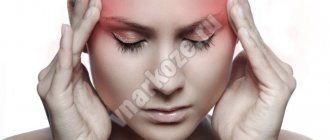Chronic lack of sleep, constant workload, stress and illness lead to the body's strength being depleted. Sluggish diseases appear that can lead to dizziness during sleep. These may be chronic diseases of the ENT organs, for example, sinusitis, or inflammatory processes in the gastrointestinal tract (inflammation of the small and large intestines). Rheumatic diseases and tuberculosis in any form can also lead to dizziness while resting at night. There is another disease that causes dizziness, it is transmitted through tick bites - Lyme disease.
A person weakened by illness notices the appearance of dizziness when he lies down to rest in the evening, and sometimes he is tormented by dreams in which he feels dizzy. Some try to find the answer in the dream book, but the answer should be sought from doctors. The cause of inadequate rest was most likely a disease that requires diagnosis and treatment.
Symptoms in a horizontal position
Dizziness is considered normal if it occurs quite rarely and under the influence of certain factors: when riding on swings, carousels and other similar attractions, when suddenly rising from a horizontal to a vertical position. This occurs because an imbalance occurs between the visual analyzing center and the vestibular apparatus due to a change in position.
It turns out that, being in a horizontal position, a person should not feel dizzy. But some patients insist that it is during a night's rest that they experience unpleasant symptoms, when they feel dizzy, sometimes accompanied by nausea and vomiting. Symptoms worsen when turning in bed. Don't expect dizziness to go away on its own. It is necessary to look for the cause that caused dizziness. These reasons may be serious changes occurring inside the body or its individual organs.
Diagnostic methods
Before you begin to treat the problem, it is necessary to conduct a diagnosis. Thanks to her, you can find out why dizziness occurs. The earlier the cause is identified, the easier it will be to get rid of it. The doctor should begin the examination with an examination, questioning and medical history. Next, the patient will need to do tests and visit some specialists.
At the same time, the doctor must find out what the nature of the dizziness is. It is also necessary to indicate whether there are accompanying symptoms, for example, headache, nausea and vomiting, tinnitus, and so on. You should describe how long the attack lasts and how often it recurs.
Most likely, the therapist will give a referral to some specialists from the following list: psychiatrist, otolaryngologist, traumatologist, neurologist, neurosurgeon, cardiologist. Which doctor the patient needs to see depends entirely on the nature of the dizziness.
Diagnostic procedures will also be prescribed to identify the causes of the condition. These include blood tests, ultrasound of blood vessels and organs, X-rays of the neck and head, ECG, blood pressure checks, various types of tomography, as well as electroencephalography.
The main reasons leading to dizziness
Experts tend to consider several reasons that cause dizziness while resting or being in a horizontal position. Usually this symptom is concomitant with the following diseases or conditions:
- Arterial hypertension or hypotension. Both of these diseases lead to instability of blood pressure, while a person may periodically experience unpleasant symptoms in the form of dizziness and vomiting.
- Atherosclerotic plaques block the lumen of vital vessels, and this leads to impaired blood circulation in the brain. Vascular atherosclerosis can be accompanied by unpleasant phenomena. A person notices that he feels dizzy even at rest, especially in the evening before going to bed, or in the morning, even before getting out of bed.
- Inner ear diseases are very dangerous. With otitis media (labyrinthitis), the mucous membrane of the inner ear becomes inflamed. Its cavity is filled with purulent contents, causing discomfort, tinnitus, and hearing impairment. Under pressure from the pus, the eardrum is displaced, causing the person to experience dizziness and pain in the head and ears. After the inflammation has been cured, symptoms of dizziness, ear congestion or hearing loss may still bother you for some time. The most common cause of peripheral vertigo is pathology of the inner ear.
- Violation of the vestibular function of the body is associated with Meniere's syndrome. With this disease, the tone of the vessels responsible for feeding the vestibular apparatus and auditory endings decreases. This disease leads to frequent loss of balance when walking, and vomiting may occur. Even during sleep you may experience dizziness.
- If patients complain of dizziness, a blood sugar test should be taken. Its elevated levels indicate developing diabetes mellitus. And this disease leads to changes in the condition of blood vessels and symptoms such as dizziness.
- The version of brain tumors should be considered. For this, diagnostic tests (for example, MRI) are prescribed. With tumors, a person may experience migraine-like headaches, complain of dizziness and decreased hearing or vision.
- When interviewing and examining the patient, it is necessary to clarify whether there have been any injuries to the skull. If they occur, symptoms of nausea and dizziness may be due to a concussion or cerebral edema.
- The patient is asked about existing diseases and medications that he is taking. Some medications have side effects such as vomiting, nausea, and dizziness.
- Poor nutrition and long-term food restrictions (fasting) can lead to the body not receiving enough of the vitamins and microelements it needs. Hence the feeling of fatigue, poor sleep, nausea, and dizziness at night.
- Heart disease (for example, tachycardia, bradycardia, arrhythmia) leads to deterioration of blood circulation: weakness, anxiety, dizziness.
- Benign positional vertigo occurs not only when standing up abruptly. Nausea can occur during physical activity, such as squats or running. To take the BPPV test, you should sit on a couch with your lower limbs extended and turn your head to the left, then quickly lie down in a horizontal position and turn your head to the right. After this, you will need to slowly rise to a vertical position.
Dizziness in a dream - causes, manifestations, danger, who treats
Dizziness during sleep can occur for various reasons. The manifestation may be short-term and not dangerous to health. Sometimes symptoms indicate the presence of diseases. This condition cannot be left unattended. Only a specialist can determine the cause and prescribe the necessary therapy.
What kind of violation is this
Dizziness is not a separate disease. The symptom indicates various pathologies. They provoke disorientation in space.
A feeling of moving or moving objects is created. Manifestations are especially common among older people and women.
Diagnosis is difficult, since dizziness is unstable and can manifest itself in varying degrees. In most cases it appears suddenly, without warning signs. It is characteristic of an episodic nature - the patient feels the appearance of a push from one side to the other.
It can also occur in the form of a sensation of objects circling around. The patient sometimes feels as if he is spinning, as if after visiting a carousel. The condition lasts from several minutes to an hour.
Why and to whom does it occur?
Anyone can experience dizziness at night. There are pathological and physiological causes for the appearance of such symptoms.
Physiological ones include:
- riding on a carousel, attractions, jumping from heights;
- severe fear;
- oversaturation of the lungs with oxygen;
- avitaminosis;
- iron deficiency in the blood due to an unbalanced diet;
- hypoglycemic conditions;
- in women before the onset of menstruation, during pregnancy.
Pathological reasons:
- ear diseases;
- osteochondrosis, cervical hernia;
- stroke;
- thrombosis, ischemia;
- migraine;
- vegetative-vascular dystonia;
- hypotension;
- panic attacks;
- tumors in the brain;
- taking certain medications.
In medicine, there are about 100 diseases that can cause daytime or nighttime dizziness.
In medicine, this symptom is called vertigo. It is important to consider that the reason may also be hidden in the psycho-emotional state of a person.
For example:
- stress;
- depression;
- prolonged nervous tension;
- suffered psychological trauma;
- phobias.
Such phenomena are often encountered by people who are afraid of heights, depth, and enclosed spaces. Psychologists identify a large number of phobias that are accompanied by such a symptom. Only a comprehensive examination will help determine the cause.
- Patients who suffer from chronic diseases often encounter such manifestations not only in their dreams.
- Such diseases in chronic form include:
- diabetes;
- epilepsy;
- varicose veins, thrombosis;
- hypertension, hypotension;
- gastrointestinal diseases.
The cause of dizziness during sleep may be associated with the development of an infectious or viral lesion. Often manifests itself with an increase in body temperature. Patients of all ages experience this.
A pinched neck and incorrect position of the spine during night sleep make waking up in the morning difficult. A person feels dizzy, has a sore neck, and may experience tinnitus.
There is a feeling of heaviness and aching throughout the body. The person feels tired and irritated.
How it manifests itself
The manifestations are pronounced. A person cannot help but pay attention to this. Sometimes this can lead to disorientation and loss of coordination of movements.
Systemic dizziness is accompanied by such symptoms.
- Feeling of your own body rotating, leaning to one side. May worsen when lying down.
- Cold extremities.
- Hyperhidrosis. Localized throughout the body or in certain areas.
- The appearance of fear, lack of air.
- Numbness of some parts of the body - fingers, lips.
- Appearance of weakness, fainting state.
- Nausea, vomiting.
- Noise in ears.
- Increased heart rate.
- Increased blood pressure.
- The appearance of dark spots before the eyes, “floaters”.
- Nystagmus.
Manifestations may decrease or intensify with a sudden change in body position or head rotation. Why you feel dizzy in your sleep can be said for sure after a certain diagnosis.
A person may wake up with a feeling of fear and panic. Often, such symptoms disappear after waking up.
Dizziness when falling asleep may indicate fatigue, excessive physical exertion, or as a result of drinking alcoholic beverages. People with bad habits experience these symptoms.
Why is it dangerous?
In most cases, the condition is not dangerous. But if accompanied by such symptoms, you should immediately consult a doctor:
- dizziness appeared for the first time, accompanied by vomiting, nausea, severe headache;
- loss of consciousness;
- accompanied by weakness, hand tremors, tachycardia, hyperhidrosis, chest pain;
- does not pass more than an hour;
- sensitivity changes, weakness appears in one half of the body.
Such conditions can be dangerous not only to health, but also to life. A doctor's examination and a full diagnosis will be required.
Who to contact
It is possible to determine why you feel dizzy in your sleep only after a full diagnosis. With such a problem, you can contact the relevant specialists:
- therapist;
- neurologist;
- vascular surgeon;
- somnologist
The first thing you can do is see a therapist. After studying the anamnesis and drying up the complaints, the specialist prescribes basic tests. Then, if necessary, he makes a referral to a specialized doctor.
Only a complete diagnosis will help determine the cause. It is not uncommon for patients to be prescribed MRI of the brain, CT, or ultrasound.
Dizziness is an unpleasant symptom that anyone can experience. A variety of reasons can provoke such manifestations.
In most cases, this is due to the influence of physiological and psycho-emotional factors. But the condition is not always safe. This may indicate the development of a dangerous pathological process.
Therefore, in any case, it is recommended to consult a doctor and undergo a full examination. This will help rule out the presence of diseases. It is especially important to exclude the development of tumors in the brain.
Neurological diseases
Chronic fatigue leads the body to exhaustion. Disorders of the central and peripheral nervous system appear. These may be disorders caused by stroke, Parkinson's or Alzheimer's disease, or senile sclerosis.
Mental disorders can cause not only dizziness: there is a reluctance to live, and a loss of interest in everything that is happening around. This is how endogenous depression manifests itself. A person begins to feel causeless anxiety, which haunts him not only during the day, but also during sleep. In the morning, such a patient wakes up not getting enough sleep, he is drawn to rest, depression intensifies, everything seems prohibitively difficult and almost impossible. Such a patient definitely needs the help of a psychotherapist.
When sleep rhythm is disturbed, a person experiences nightmares. In them, he feels like he is being pulled into an abyss or a whirlpool, he wakes up from severe dizziness and a feeling of anxiety. The same nightmares haunt people with mental disorders, for example, with a depressive disorder or with excessive anxiety. Nightmares do not allow a person to fully rest. They aggravate the situation, lead to the fact that a person does not get enough sleep and begins to become even more nervous, worried, aggressive or depressed. The help of a specialist in this case will be very necessary and important.
Treatment approaches
Effective treatment of diseases is possible only after a full clinical examination of the patient and consultation with a doctor. In this case, treatment should primarily be aimed at eliminating the underlying disease:
Under no circumstances should you self-medicate. This is fraught with the development of side effects of therapy, as well as possible progression of the underlying pathology.
In addition, many patients use traditional medicine. However, such treatment approaches do not have proven effectiveness and safety, and therefore they should not be used as monotherapy, but should always be prescribed in combination with medications.
Dizziness during or after sleep is an unpleasant symptom that causes a decrease in quality of life and is accompanied by significant discomfort for the patient. There are many reasons for the development of such conditions, and only the attending physician, after conducting a clinical examination, can make an accurate diagnosis. In this regard, in no case should you delay contacting a medical institution. Early initiation of therapy allows you to achieve complete recovery and ensure the absence of relapses of various diseases.
Source
How to help the body
To treat vertigo, it is necessary to find out the exact cause of the disease. But it is not always possible to do this. After all, you need to undergo many diagnostic measures, examinations, and visit more than one specialist. And the person needs help now, because his condition is getting worse day by day. Nightmares, anxiety, dizziness, nausea - they take you out of balance. Therefore, the doctor can prescribe medications that improve the patient’s condition even before completing a full examination. These will be remedies that relieve stress, eliminate nausea and dizziness. Medicines that improve cerebral circulation will be mandatory.
If dizziness during sleep is diagnosed, the causes of which lie in peripheral vertigo (middle ear problems), surgical intervention may be required. Endolymph drainage, labyrinth surgery, or surgery on the auditory nerve are performed.
The amount of dizziness can be reduced through a properly designed menu. The diet should be designed so that it includes foods rich in iron, magnesium, as well as essential vitamins (C, P, B). You should limit your intake of tea and coffee, it is advisable to give up chocolate and other sweets. Tobacco and alcohol addiction must also be cured. The diet should be aimed at eliminating excess fluid from the body. To do this, reduce the amount of salt and salty foods consumed daily. The total amount of fluid entering the body should not exceed 1.5 liters per day.
Before going to bed, you can take a leisurely walk in the fresh air. It would be better if it was a quiet park. To eliminate dizziness, specially designed rehabilitation exercises performed without overexertion are recommended.
How to treat illness?
Treatment for the development of dizziness during sleep is necessary in most cases. As a rule, many people try to ignore the symptom or treat themselves with remedies from the home medicine cabinet. This is the wrong approach, as it can lead to the development of negative consequences.
Diagnostics
Before prescribing treatment, you should find out what pathology caused dizziness during sleep. To do this, you need to undergo an examination and visit a number of specialists. The examination begins with a thorough examination, interviewing the patient and collecting an anamnesis.
At the same time, the nature of dizziness, accompanying symptoms (headache, nausea, vomiting, tinnitus, etc.), frequency and duration of attacks are clarified. You may need to consult the following specialist doctors:
- cardiologist;
- traumatologist;
- neurosurgeon;
- otolaryngologist;
- neurologist;
- psychiatrist.
Diagnosis of central and peripheral vertigo
Additionally, a number of diagnostic procedures are prescribed to determine the causes of the pathological condition. Often prescribed:
- blood analysis;
- ultrasound examination of blood vessels and organs;
- X-ray of the skull and neck;
- electrocardiogram;
- blood pressure monitoring;
- electroencephalography;
- computed tomography (CT) or magnetic resonance imaging (MRI).
Purpose of therapy
After identifying the cause of dizziness that occurs during sleep, an appropriate treatment regimen is prescribed. It consists of treating the underlying pathology, after which the symptom of dizziness disappears on its own. There are several methods of therapy that are used depending on what pathology should be treated. Among them:
- Drug therapy. There are no medications that eliminate dizziness. With such a symptom, the underlying pathology should be treated. Often prescribed:
antidepressants and sedatives (Deprim, Sedafiton);- drugs that increase or decrease blood pressure (Nifedipine, Gutron);
- heart medications (Metoprolol, Bisoprolol);
- vasoconstrictors or vasodilators (Vinpocetine, Caffetamine). They are prescribed only by the attending physician. The patient takes medications in accordance with his treatment regimen, which includes dosage, duration of therapy and method of taking the medication.
anti-inflammatory drugs (Diclofenac, Nurofen);
- manual therapy;
acupuncture;
Methods of rehabilitation measures in patients with dizziness
General recommendations
In order to avoid an attack of dizziness during sleep, you need to follow some rules. As a preventive measure it is recommended:
- walk more in the fresh air;
- to live an active lifestyle;
- avoid stress and emotional turmoil;
- Healthy food;
- maintain a sleep and rest schedule;
- timely treat pathologies that are accompanied by an inflammatory process (otitis media, meningitis);
- control blood pressure.
A set of exercises for dizziness
An attack of dizziness most often occurs when a person is in an upright position. If this symptom is observed during sleep, then most likely there is some kind of pathology. Before treating dizziness, the cause of its occurrence should be determined. Prevention can help prevent attacks. If you follow these simple rules, you can avoid dizziness during sleep, as well as improve your overall health.
What are the reasons?
Dizziness combined with weakness and nausea can be caused by a variety of reasons. For example, this situation develops with a sharp increase or decrease in blood pressure.
Pregnancy is one of the most common reasons why a person develops dizziness and nausea. Discomfort occurs immediately after waking up, but may persist throughout the day.
People who often go on all sorts of diets and also limit their body to food of animal origin get dizzy.











